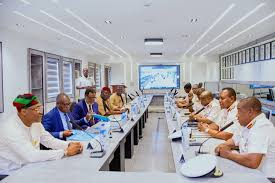Maritime
Reps Disagree Over Jonathan’s Import Policy
The House of Representatives on Tuesday threw out a motion for the reversal of the Federal Government’s latest import policy which has opened the gate for the importation of used cars and other items.
But the House also took the Minister of Finance, Mr. Olusegun Aganga, to task over the implementation of the 2010 budget saying the Executive had a poor showing especially over capital expenditure.
Mr. Gbenga Onigbogi, from Osun State, had raised a motion under Matter of Urgent National Importance calling the attention of his colleagues to President Goodluck Jonathan’s policy of opening the nation’s ports for the importation of hitherto banned products.
The President had recently lifted ban on cars above 10 years and other items such as furniture, textile materials and other sundry items.
Many Nigerians had condemned the decision to open the gate for foreign products arguing that the decision amounted to directly killing local manufacturing industries.
Onigbogi, presenting his motion, said by lifting ban on the items, Jonathan contradicted his resolve to accelerate the process of rejuvenating the nation’s manufacturing sector.
Specifically, he said the textile industry, which accounted for the employment of thousands of Nigerians in the past had become comatose.
Members of the House who supported Onigbogi’s motion include Isah Umaru, Mustapha Aliu, Kayode Idowu, while the motion was opposed by Hon Ndudi Elumelu, Leo Ogor, Darlington Okereke and others.
Supporting the motion, Hon. Kayode Idowu from Osun State stated that the country needs to encourage local production.
He said, “When we look at the economic policy of this country, you will find out that it is not a productive economy. We have to look into encouraging local production in this country.”
Mustapha Aliu, while contributing to the debate, said the productive sectors of the economy that should be absorbing graduates from various universities was being killed with policies such as the latest one on importation.
“We are graduating engineers year-in year-out, but we are not supporting industries to absorb them. We are killing the industries to absorb them.”
Aliu said as a member of the board of the newsprint manufacturing company in Okuiboku, he was aware the company produced 2000 direct jobs and more than 5000 indirect jobs.
He said with the death of the company, all that had become history.
Isah Umaru said government’s intervention in saving the textile industry from total collapse would be meaningless should the government go ahead with its latest policy on importation.
He said, “Just recently the FG intervened to save the textile by commissioning some textile companies in Kaduna. I cannot understand the intention of government by lifting ban on textile materials. To me, it is a policy summersault.”
Opposing the motion, Hon. Ndudi Elumelu, Delta, said the country needed the revenues coming from importation to support the local industries.
“We must open our markets for the purpose of ensuring that we increase the revenue that is accrued to this country,” he said
Arguing further, Elumelu said that most people in the country could not afford new cars hence the availability of used cars will enable workers on minimum wage to own cars.
He said, new cars cost as much as N4 million to N6 million. In my federal constituency, we are very poor, not everybody can afford that amount to purchase one vehicle. So, we must open the market and allow the poor to survive.”
He said the country needed the revenues coming from importation to support the local industries. “We must open our market for the purpose of ensuring that we increase the revenue that is accrued to this country.”
Hon. Leo Ogor also said the government is losing revenues through the ban on the importation as he noted that the same banned items still find their ways into the Nigerian market. “Govt is losing revenues,” he stated.
He submitted that a reversal of the policy would not be in the interest of the common man.
Also opposing the motion, Hon. Darlinton Okereke, the ban on the items leads to loss of revenues.
He opposed the motion and said the products come into the country despite the ban with the country recording loses in revenue.
In his reaction to the contributions of those who opposed the motion, Onigbogi said generations yet unborn would not forgive them for the failure to do the right thing saying though importation might appear attractive now, the long term effect would be disastrous.
The House also queried Federal Government’s alleged poor implementation of the 2010 budget as the Minister of Finance, Mr. Olusegun Aganga, came under fire over capital expenditure, depeletion of the foreign reserves and constituency allowances of members.
Those who queried the minister include Minority Whip, Ali Ndume, Hon. Abdul Ningi, Mr. Femi Gbajabiamila, Jerry Manwe, Tsegbaa Terngu and others.
Admitting lapses in the implementation of the 2010 budget, Aganga assured the lawmakers that the government was serious about making up for the poor implementation in the 2011 budget.
He said, “There will be changes this year in the way capital budgets are implemented.”
Maritime
NCC Announces Telecoms Facilities Protection Measures

Maritime
Bureaucracy, Relationship Gaps, Bane Of Maritime Safety Investigation – NSIB

Maritime
UNDP, REA Partner On Clean Energy Transition

-
Featured3 days ago
Rivers LG Poll: APC Wins 20 chairmanship seats, PDP Clears Three
-
News3 days ago
Stop politicising Niger Delta’s plight over personal interest, Ex-militant warns Ijaw youths
-

 Nation3 days ago
Nation3 days agoAccolades, Fanfare As Ogbakor Ikwerre President General Celebrates 80th Birthday
-
News3 days ago
Cleric Condemns Increasing Theft in God’s House
-
News3 days ago
Keep faith with Tinubu’s Renewed Hope Agenda – NOA begs Nigerians
-

 Niger Delta4 days ago
Niger Delta4 days agoBayelsa Tasks Security Agencies On Vigilance Over Waring Communities
-
News3 days ago
Okpebholo, Edo Speaker mourns ex-IGP, Arase
-
News3 days ago
Ojulari: CNPP, civil society groups demand judicial probe into NNPCL

